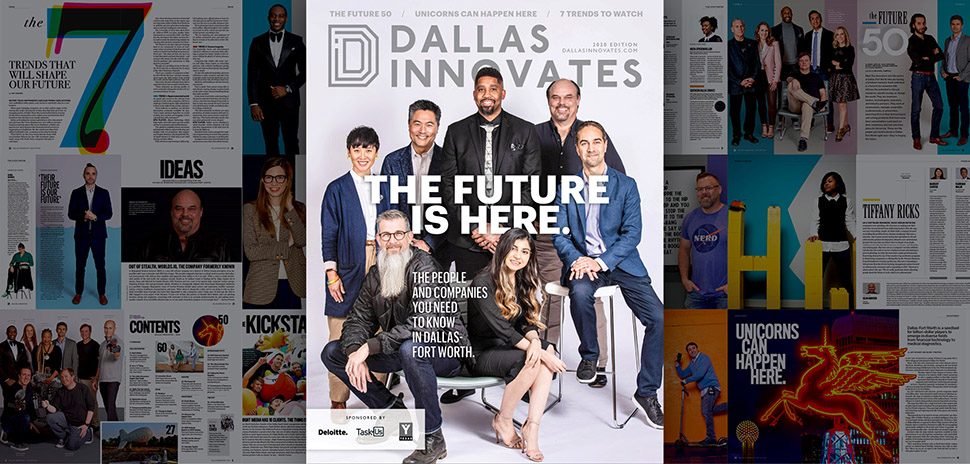What does it take to build a champion? Dallas billionaire Clark Hunt should know. The owner of the reigning Super Bowl champion Kansas City Chiefs offered a blueprint forged from his family’s nine decades of shaping American sports at the recent Venture Dallas conference.
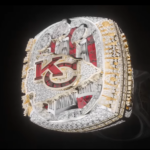
Kansas City Chiefs Super Bowl LVII ring
Hunt, chairman and CEO of both the Chiefs and his hometown FC Dallas soccer franchise, was the headliner for the opening event at the annual summit connecting innovators and investors at the George W. Bush Presidential Center on Oct. 25. He sported the ultimate icon of the Chiefs’ 2022 season glory—a massive 16.10-carat diamond-encrusted Super Bowl ring featuring over 660 gems, including 50 symbolizing Arrowhead Stadium’s 50 years as the Chiefs’ home.
Hunt sat down with Anurag Jain, co-founder and managing partner of Perot Jain, for a wide-ranging conversation on creating champions, transforming a team into a juggernaut, and growing the sport of soccer in the U.S.
Jain brought his own team owner’s perspective, having tapped Hunt’s wisdom when launching his new Texas Super Kings cricket franchise in 2022.
“I called you first when we were trying to bring cricket to the U.S. because your family has so much history in bringing new sports here,” Jain told Hunt.
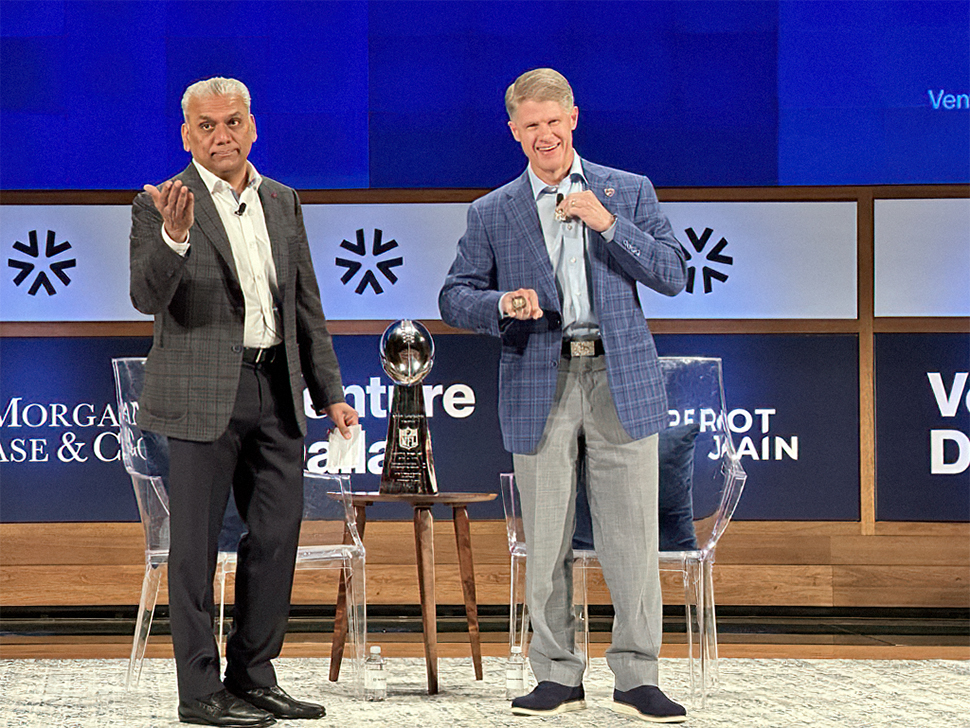
On stage at Venture Dallas, Anurag Jain asks Clark Hunt to show off his 16.10-carat Super Bowl ring with its “magical” removable top that turns into a pendant. [Photo: Dallas Innovates]
But first, the Taylor Swift phenomenon
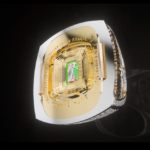
The Chiefs’ LVII ring pops its top to reveal Arrowhead Stadium, two Lombardi trophies, and a quote from Lamar Hunt.
After admiring Hunt’s Super Bowl ring and before reminiscing about the Hunt family’s contributions, the two owners touched on a surprising boost for the Chiefs—pop phenom Taylor Swift.
Hunt admitted the team was blindsided when Swift embraced the Chiefs last fall, bringing with her legions of young female fans. “The Taylor Swift thing has been a total surprise,” he said.
The chart-topping pop star has motivated millions of “Swifties” to become Chiefs fans, too, as she “watches her rumored boyfriend, Kansas City Chiefs tight end Travis Kelce” trounce rival teams.
“It’s something that we didn’t see coming … and caught the NFL by surprise,” Hunt said. “Her power and her fan base is incredible.”
Hunt recounted a gameday scene that demonstrated the pop star’s magical allure earlier this month. “I was signing an autograph, and I had about 20 fans in front of me,” he said. “All of a sudden, they started screaming right in my face.
“My first thought was, Patrick Mahomes must have walked behind me,” he said. “But no, Taylor Swift was walking into the building. It just shows you the power of Taylor.”
Swift’s fandom has paid big dividends for the Chiefs as they court a new demographic: young women. “It’s been incredible in terms of what it’s done,” Hunt said. “For the NFL audience, we’ve had a huge shift for our games to young women, which is a very tough demographic,” he said. “It’s been a lot of fun.”
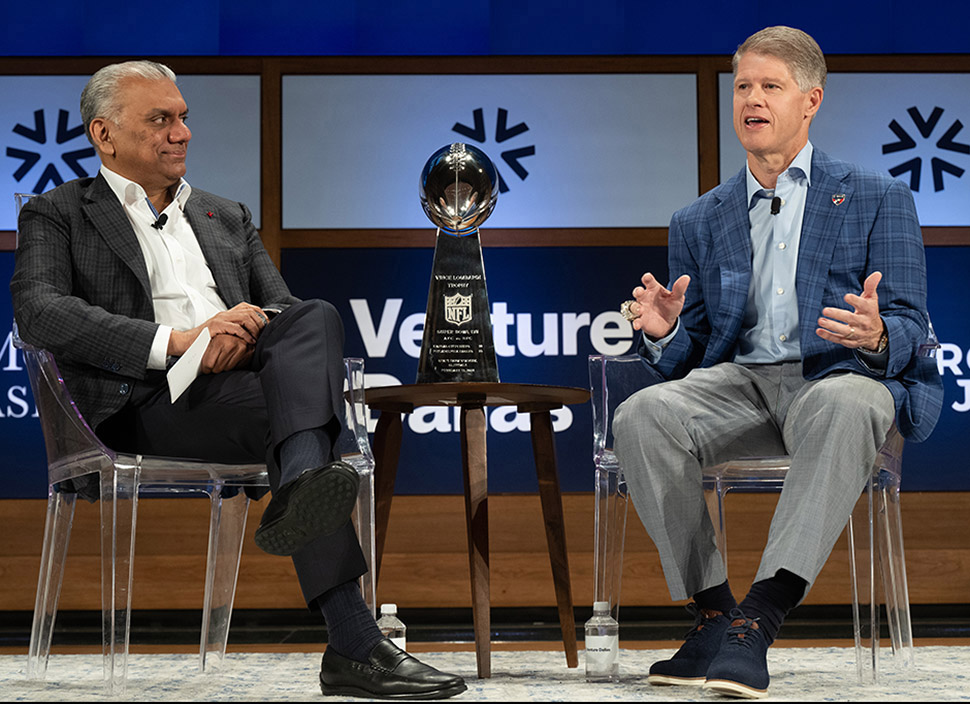
Anurag Jain and Clark Hunt [Image: Grant Miller Photography/Venture Dallas]
Becoming the Chiefs
Clark Hunt took over ownership of the NFL’s iconic Kansas City Chiefs franchise in 2006, after his legendary father, Lamar Hunt, founder of the Chiefs, passed away. The younger Hunt became chairman that year and CEO in 2010.
Like the Chiefs franchise, Clark Hunt’s origins lie in Dallas. The Hunt family has deep Dallas ties spanning multiple generations.
“My family has almost a 90-year history in Dallas, running and operating businesses, and my dad back in the late ’50s was interested in bringing an NFL team to Dallas, when Dallas didn’t have an NFL team,” Hunt said.
Hunt’s grandfather, oil tycoon H.L. Hunt, launched the family’s fortunes here in the 1930s and became one of the eight richest people in the U.S. by the 1950s. H.L.’s son Lamar—Clark Hunt’s dad—was passionate about sports, but not about oil, he said.
After college at SMU, Lamar Hunt saw pro football as a golden opportunity, Hunt said. “He watched the 1958 championship game between Baltimore and the Giants. Dad concluded that the game televised really well.” It was a very insightful perspective on his part, the younger Hunt noted.
In 1959, Hunt’s dad tried unsuccessfully to acquire an NFL expansion team for Dallas. The NFL also rebuffed his bid to buy the Chicago Cardinals and move them to Dallas.
“The NFL commissioner told them two things. First of all, the league’s not interested in expanding. And secondly, Dallas is a horrible market for pro football,” Hunt said.
But the visionary Lamar Hunt wouldn’t take no for an answer.
“My dad was on a plane flight home and would later say, ‘It was like a lightbulb went off in my head,'” recounted the younger Hunt. “Dad said, ‘If there are other people who want to start a league, I’ll go see them. And we’ll start a new league to compete with the NFL.'”
Hunt then enlisted seven other investors to launch the upstart American Football League. The AFL kicked off in 1960, with Lamar Hunt’s own team, Dallas Texans, as a charter franchise.
According to Hunt, the NFL was initially tolerant of his father’s new league, “largely because they were under antitrust scrutiny from Congress.”
But months later, the NFL saw Hunt’s league might actually succeed: That’s when “the NFL reversed field, literally, and created the Dallas Cowboys. So both the Texans and the Cowboys launched in Dallas in 1960.”
But Hunt’s dad refused to fold, he says, even after three hardscrabble seasons playing at the Cotton Bowl while the NFL’s expansion Dallas Cowboys siphoned fans.
“But neither team drew more than 10,000 fans, which is hard for us to believe in the context of the NFL today,” Hunt said onstage at Venture Dallas.
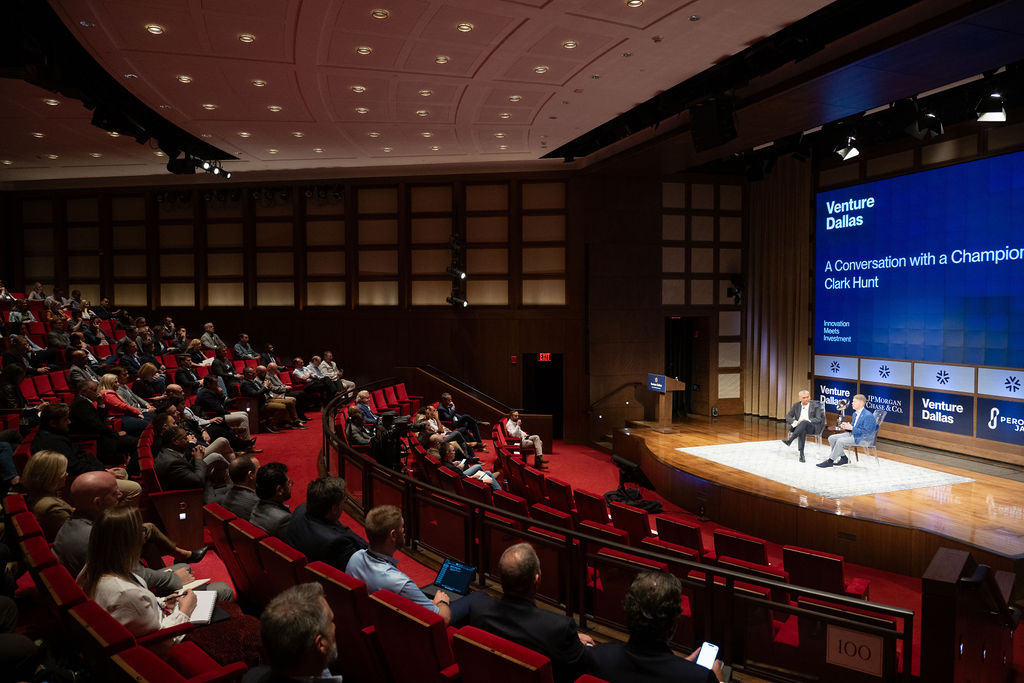
[Photo: Grant Miller/Venture Dallas]
Moving to KC
After three seasons in Dallas, Lamar Hunt concluded the franchise needed a fresh start elsewhere for the AFL to thrive. “My dad decided that for his franchise to be successful, and for the American Football League to be successful, he would need to move his team to a place where he could have the market by himself,” Hunt said.
So in 1963, Lamar Hunt moved his AFL franchise to Kansas City and renamed them the Chiefs. The gamble succeeded, likely sparing the AFL from early extinction.
But his dad’s rivals feverishly competed for players, Hunt says, with clandestine operatives called “goons” working to hide players from the rival league. It was an expensive battle, and the NFL eventually realized the AFL “wasn’t going away.”
After six seasons, the rival leagues struck a deal in 1966. After a Cowboys representative approached Lamar Hunt, the AFL and NFL “met at Love Field at the old Texas Rangers statues that were inside the terminal and went out, got in the car, and talked for 45 minutes.” They emerged with an outline that got things moving—and plenty of planning meetings lay ahead for their new championship game pitting AFL and NFL champs.
Naming the Super Bowl and the Lombardi trophy
It was in one of those meetings that Lamar Hunt coined the now-legendary name, “Super Bowl.” It first stuck internally.
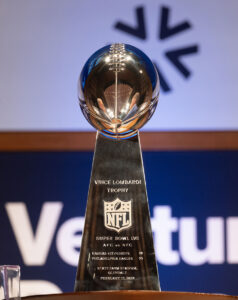
[Photo: Grant Miller/Venture Dallas]
“The only problem was, the NFL commissioner actively disliked the name. He thought it lacked sophistication,” Hunt told the crowd at Venture Dallas. That’s why the first two championship games were called the AFL-NFL World Championship Game, “which, of course, is not very catchy.”
But fans—and the media—did like saying, watching, and broadcasting the “Super Bowl,” so Hunt’s moniker stuck.
The Chiefs appeared in the very first Super Bowl in January 1967, losing to the NFL’s Green Bay Packers, 35-10. The Packers went on to become a dominant NFL team in the 1960s, winning the first two Super Bowls. But after the Packers’ Super Bowl II victory, their legendary coach Vince Lombardi fell gravely ill.
That was when Lamar Hunt wrote the NFL commissioner with a proposal to name the Super Bowl trophy after Vince Lombardi, pointing out “all he’s done for the game of pro football—and the fact that his team won the first two Super Bowls.” The commissioner agreed. Today, the Super Bowl winner still receives the “Lombardi Trophy” in tribute, Hunt noted, gesturing to the trophy on stage.
A “complete cultural reboot” at the KC Chiefs
When Hunt took over the Chiefs in 2006, early seasons were “challenging.” There are good and bad years in the sports business, he said, and when you’re handling the bad ones, “they sure are tough, and it’s hard to figure out how you get it turned around.”
“Even though the NFL is designed to help weaker teams by allowing them to draft higher, it’s still very hard to turn a losing team around.”
In about 2012, Hunt recognized the Chiefs needed a “complete cultural reboot.” The hands-on owner restructured the front office and hired Andy Reid as head coach. Reid reported directly to Hunt.
Jain asked Hunt how he hires leaders to drive success.
“I would say that maybe I got lucky right out of the bag,” the Chiefs CEO said. “Andy Reid had been fired in Philadelphia at the end of the 2012 season. And he was one of my first interviews.”
That interview was supposed to run three or four hours but ended up going for nine hours: “We just hit it off—there was tremendous chemistry,” Hunt said. “We did it in an FBO. There was literally a plane outside that was waiting to take him to Arizona and San Diego for scheduled interviews. He never got on that plane.”
Reid and Hunt’s efforts sparked a quick turnaround, with the Chiefs rebounding to start 2013 with nine straight wins.
Hunt praised Reid’s veteran leadership and “incredible” capacity to mold team culture: “In most large businesses, your best assets are in people,” Hunt said. “In professional sports, really, your only assets are the people—the players, the coaches, the front office—and if you don’t have a culture, it’s very, very challenging to win.”
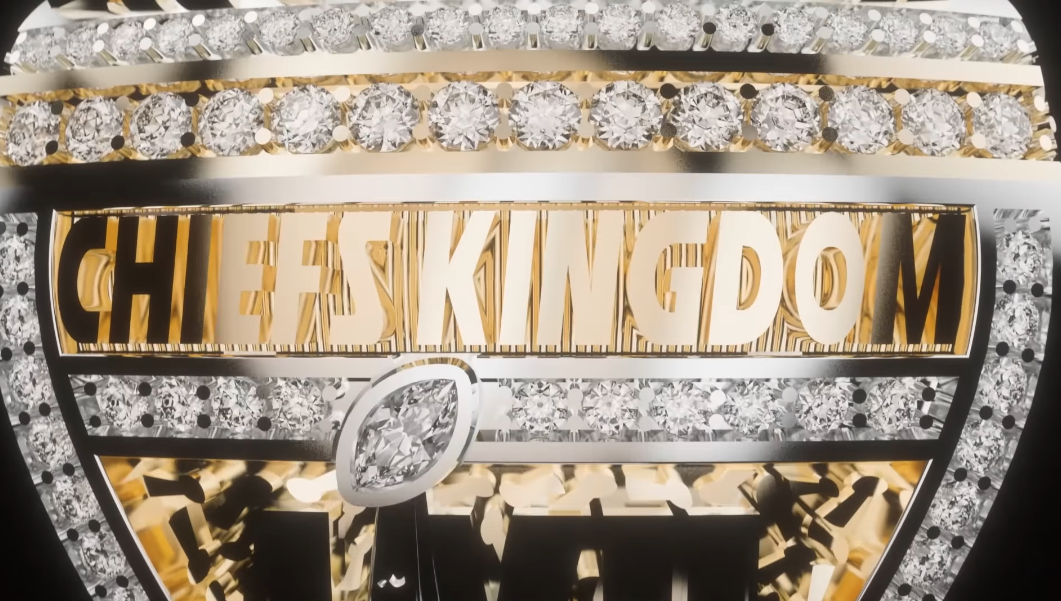
Closeup of “Chiefs Kingdom” on the team’s Super Bowl ring. [Kansas City Chiefs video screenshot]
Snagging QB Patrick Mahomes
But Hunt and the Chiefs leaders also knew a franchise quarterback was essential to becoming a perennial contender. The team targeted Patrick Mahomes in the 2017 NFL Draft after extensive scouting revealed his potential for greatness, Hunt said. And it paid a hefty price to trade up and grab Mahomes 10th overall.
Chiefs GM Brett Veach proved instrumental in landing Mahomes in the 2017 NFL Draft, according to the Hunt. After following Reid from Philadelphia, Veach, who is now Chiefs GM, served as a scout under the coach. Reid soon came to place immense trust in Veach’s evaluations.
“[Veach] was head of college scouting for the 2017 draft. Starting back in 2015, every week, he would go to his office, and he would put a tape on [Reid’s] desk. And that tape was this young gunslinger named Patrick Mahomes, who was at Texas Tech,” Hunt explained.
Hunt said Reid remained noncommittal even after six or seven “glowing” game tape reports from Veach on the Texas Tech player. “After six or seven of these tapes, [Reid] said, ‘Brent, I get it—the kid’s special,'” Hunt recounted.
Joining the team in 2018, Mahomes immediately became the second quarterback in NFL history to throw for 50 touchdowns and 5,000 passing yards in a single season. (Peyton Manning was the first.) In 2020, Mahomes led the Chiefs to Super Bowl LIV victory while earning Super Bowl MVP honors. In 2023, he won his second Super Bowl and second Super Bowl MVP trophy. At just 28 years old, Mahomes is already destined for the Hall of Fame—and many see even more Super Bowls in his and the Chiefs’ futures.
According to Hunt, the Chiefs plotted to grab Mahomes in the 2017 draft. Initially projected as a second-rounder, Mahomes’ stock rose as the draft neared: He became a late first-round projection and then moved up further into the middle of Round 1. “There were two other good quarterbacks in that draft class. Thankfully, a lot of teams were really focused on those two,” Hunt said.
The Chiefs knew leapfrogging those interested teams would require a bold trade up from their 27th overall pick: “We concluded that we needed to move all the way to the 10th Pick, in order to be able to get Patrick,” Hunt said. Teams selecting 11th, 12th, and 13th all appeared poised to take Mahomes. To obscure their target, Kansas City concocted a clever “smokescreen” feigning interest in trading up for an Alabama linebacker.
“Our staff did a great job of—I don’t want to say lying—but creating some doubt as to who we were moving to get,” Hunt said.
The ruse worked. The Chiefs struck a deal with the Buffalo Bills to trade up to the 10th pick uncontested. There they nabbed Mahomes, setting the franchise up for a decade or more of outstanding quarterbacking.
“We were able to play with the Buffalo Bills to move up to that 10th spot. And the rest is history from there,” Hunt said, smiling.
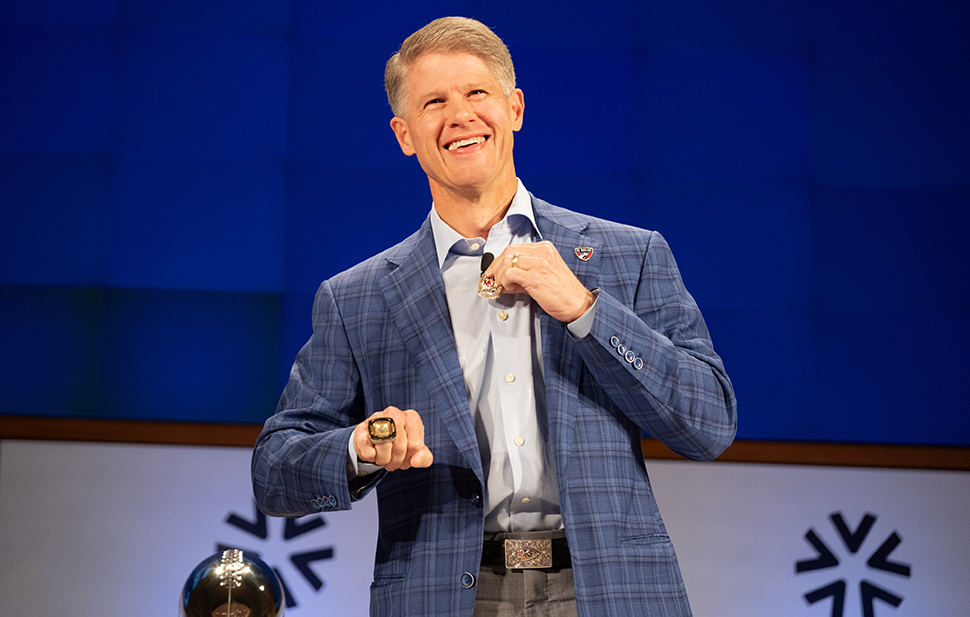
Clark Hunt [Photo: Grant Miller]
Nerves on the sidelines
Jain shifted the conversation to the thrills and challenges of sports team ownership, drawing on his recent experience launching a cricket franchise.
“It’s been an interesting journey as an owner,” Jain remarked. “I talked to clients about the owner’s nerves on the sidelines, or the effort it takes to bring a new sport to the country. I thought ownership would just be fun. But it turns out, it’s real work!” he said with a smile.
Hunt agreed that owning competitive teams produces its share of nerves: “Every game is so important.”
“When you’re there cheering your team on, people always ask what it’s like as an owner. I tell them, ‘It’s like being a fan—but on steroids,’” Hunt said.
He explained that losses sting more than wins exhilarate. “It literally takes two or three wins to make up for a loss. From a mentality standpoint, the losses are so painful.”
Hunt also described the hectic pace of managing multiple sports franchises. “We’ll have three teams we’re closely following this season,” between the Chiefs, his hometown FC Dallas soccer club nearing the MLS playoffs, and the NBA’s Chicago Bulls.
Popularizing soccer in the U.S.
Jain asked Hunt how his father, Lamar, first sought to bring soccer into the American sports mainstream decades ago.
“My dad was literally a serial entrepreneur across sports,” Hunt said. “At one point, he had pro football, soccer, tennis, and basketball ventures.”
In the late 1960s, the elder Hunt was captivated by soccer after tuning into World Cup matches on TV and in person. At the time, the NFL was building massive new stadiums like Arrowhead.
Hunt realized these mega venues sat empty each summer and had another lightbulb moment. “Soccer was so big globally. He thought he could import it to the U.S. and fill NFL stadiums during their offseason,” Hunt said.
Lamar Hunt invested in the upstart North American Soccer League in 1967. “Those old enough may remember the star-studded New York Cosmos with Pele and Giorgio Chinaglia,” Hunt recalled.
His own team, the Dallas Tornado, lacked such firepower, Hunt said. They played at Texas Stadium but struggled to gain traction. “It just never caught on, despite my dad’s passion,” Hunt said.“There weren’t enough investors to keep it going. But my dad never lost interest in the sport.”
Neither did his son. Hunt became a devoted soccer fan, estimating he has attended 12 of the last 13 World Cups dating back to 1974. “I played soccer in college, and I have a tremendous passion for it,” he said.
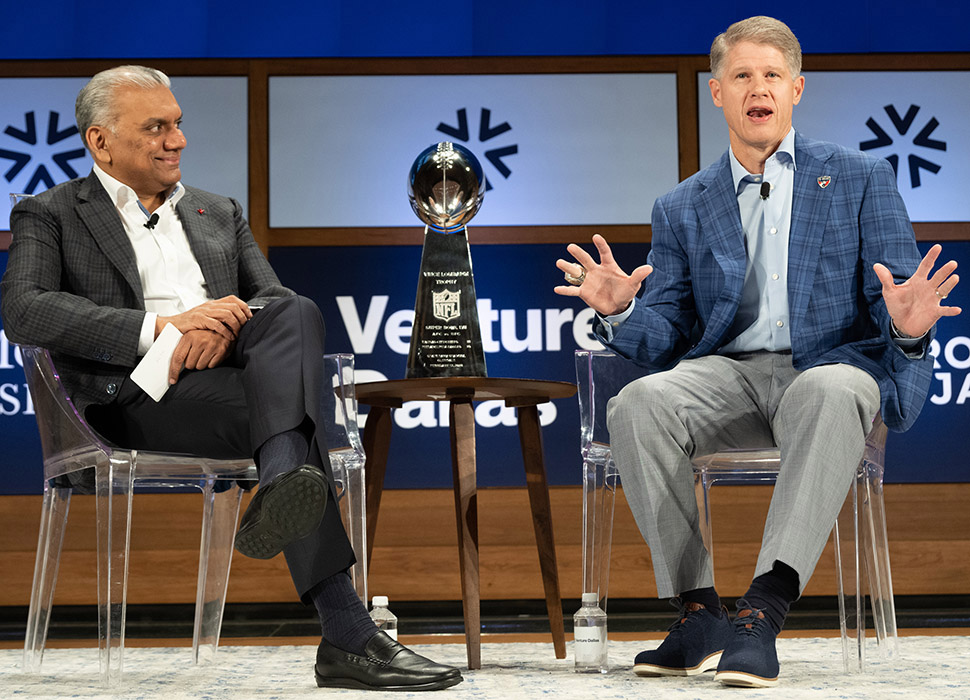
Anurag Jain and Clark Hunt [Image: Grant Miller Photograph/Venture Dallas]
Slow start, near collapse for MLS
Major League Soccer was born out of the 1994 World Cup, Hunt said. “It was one of the first things that I worked on with my dad back in 1995. It launched in ’96.”
When the U.S. was awarded the 1994 World Cup, “one of the conditions that FIFA gave us was that U.S. Soccer had to start a new Division One Soccer League, because the North American Soccer League had gone out of business in the early ’80s,” Hunt said.
MLS debuted small in 1996 with “only two teams—the team in Kansas City and the team in Columbus,” Hunt said. “Ironically, we didn’t own the team in Dallas.”
“The league got off to a great start,” he said, “There was a lot of momentum that came off the World Cup.” But the MLS faced growing pains. “By 2000 and 2001, the league was in a sophomore slump. It almost went out of business,” Hunt said.
With the league on the brink, “We did a reorganization of that reorganization, and our family took over control of what was then the Dallas Burn. So we went from two teams to three teams,” said Hunt. “I’ll tell you, that was two too many. As you know, owning one franchise is more than enough.”
Joined by other owners like the Kraft family, “We saved the league and nursed it for about three or four years,” Hunt said.
MLS rebounded as Hunt’s father envisioned. “I like to say my dad’s vision for soccer was right. He was just 40 years too early. Because the sport has really taken off from about 2005,” he said.
Today, Major League Soccer has grown from 10 teams to 30 teams with about 24 stadiums that have been built for them. And this past summer, soccer fever swept the nation when global superstar Lionel Messi joined MLS club Inter Miami and went on what Hunt called a “magical run.”
But building MLS into a world-class league took decades of persistence. “It’s been a long, arduous process, not only for Major League Soccer, which is in about its 27th or 28th year, but also for our family and those pioneers who go back to the early days of the North American Soccer League,” Hunt said.
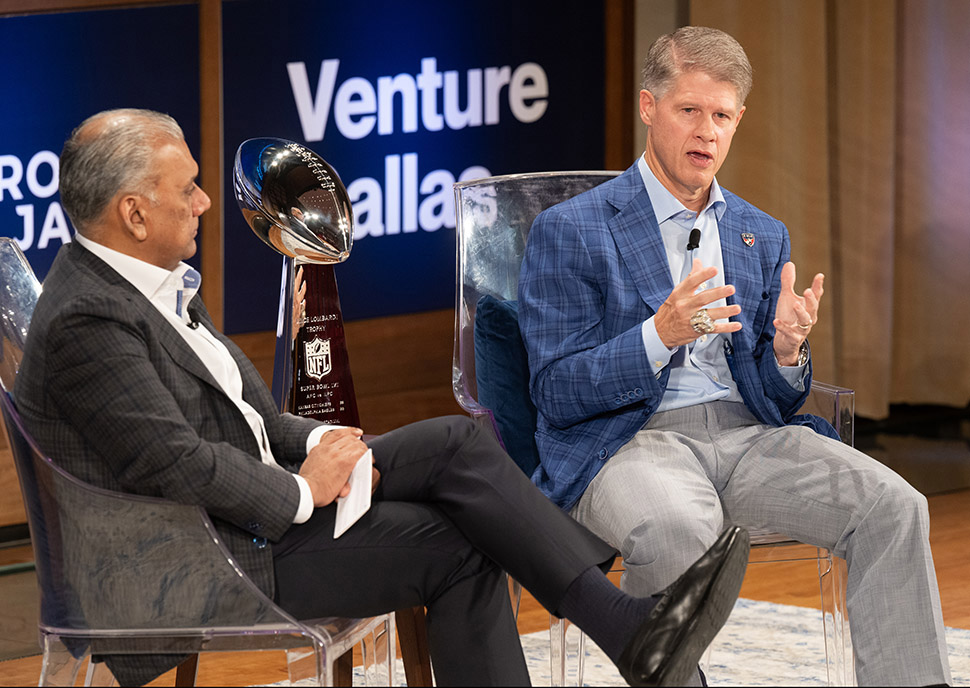
Anurag Jain and Clark Hunt [Image: Grant Miller Photography/Venture Dallas]
Hunt brothers drive Dallas and KC World Cup bids
Jain noted that Hunt and his brother, Dan Hunt, president and co-owner of FC Dallas, worked hard to bring the World Cup back to the U.S. in 2026. “What does that mean this time around?” Jain asked.
According to Hunt, a little-known fact about the 1994 World Cup is that it was the “most successful World Cup ever from a financial standpoint.” He admits that’s “hard to believe,” given its popularity as a global sport. Hunt attributes that success to the U.S. hosting model. “Our very large football stadiums were able to host a very successful World Cup,” he said, noting that Dallas was a host in 1994.
Now headed back to North America for the 2026 World Cup, FIFA decided through a bid process to share the event among the U.S., Mexico, and Canada. Hunt calls its scale “unprecedented.”
They’ve expanded the tournament, he noted. “There’ll be 48 teams in the tournament, over 100 games. It’s going to be a very big deal in the summer of 2026.”
Both Kansas City and Dallas have been selected as 2026 host cities after a competitive FIFA bidding process, he said. Hunt serves as co-chair of Kansas City’s host committee, while his brother Dan Hunt fills the same role in Dallas.
“We’ve got a little family rivalry going on. But truthfully, we’re delighted to be hosting games in both markets,” Hunt remarked.
Now FIFA is deciding which cities will host key marquee matches. Hunt believes Dallas has “a very good chance” to land one of the four major ones—the opening match, the two semifinals, and the final.
Landing the World Cup final would be “amazing” for Dallas, according to Hunt: “It would be another acknowledgment of what a great place Dallas is to do business.”
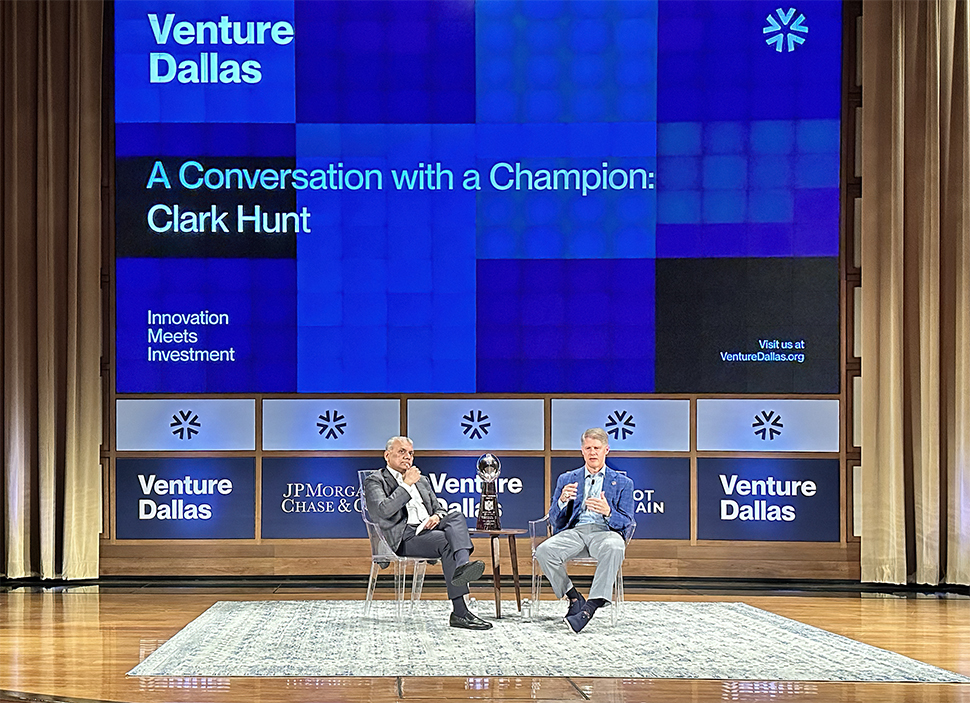
Anurag Jain and Clark Hunt at the Venture Dallas summit. [Photo: Dallas Innovates]
‘We’re in the business of winning’
Jain shifted the conversation to lessons business leaders can draw from sports.
“Mission statements are really important for organizations,” he said. “Yours shapes the Chiefs’ culture. How does it guide your decisions and hiring?”
“We’re in the business of winning, and that’s our primary focus. But we want to do it the right way,” Hunt said.
The Chiefs’ mission statement permeates the franchise’s culture: “It’s hard to miss… literally, every day when our employees come into the training facility—it’s up on the wall.” While building winners, the Chiefs adhere closely to that longstanding mission statement: Honor Tradition, Inspire Fans, Unite Our Community, and Win with Character.
Hunt spotlights those values when addressing rookies at training camp, many arriving from college fretting over just making the team. “You’ll have an amazing platform to make a difference. Use it to give back, not just for yourself,” he tells them.
‘I’m not the one who’s writing your check,” he reminds the players. “It may say Kansas City Chiefs on that check. But it’s the fans who write the check. And you need to be sure and say ‘thank you’ to them.”
Jain noted that resonates with companies too. “You’ve built consistent winners. What’s your formula?” he asked.
Hunt shared key advice: “Make sure that the people you bring into your organization as leaders not only share your vision, but share your values, and that they’re capable of creating the culture that you want.”
He explained leaders’ actions and messaging either reinforce or undermine the culture. “If they communicate something different, it’ll go off the rails.”
In pro sports, it’s unsurprising that divisions can emerge between business and sports staffs, Hunt said. Players fixate on sports, believing “the world revolves around them—they just do. The players have been told that since the time they were 10 years old, right?”
Fortunately for the Chiefs, President Mark Donovan bridges that gap, he said. Donovan played college football and understands locker room mentality. “He and Andy Reid think very much alike. And together, they’ve helped create this incredible culture in our building.”
Hunt credits Donovan, Reid, and GM Veach for executing his vision.
![Anurag Jain and Clark Hunt [Image: Grant Miller Photography/Venture Dallas]](https://s24806.pcdn.co/wp-content/uploads/2023/10/Hunt-20231025Brigade@GWBPC-VentureDallas-2509.jpg)
Anurag Jain and Clark Hunt [Image: Grant Miller Photography/Venture Dallas]
‘Preaching to the choir’ on Dallas
Bringing the discussion back to North Texas with one last question, Jain said, “Kansas City is an important place to you with a huge operation there. But Dallas is home. You were brought up here, you grew up here, your family grew up here. Tell me more about ‘why Dallas’—what makes it special?”
Hunt understands why Dallas natives brag on their city—he does too. “I know many of you are from Dallas,” he told the crowd. “So I’ll be preaching to the choir. But Dallas is an incredible place not only to live, but to do business.”
He touted strengths like a “tremendous workforce” that keeps expanding as people flee California for Texas. “The state of Texas, the city of Dallas, and many of suburbs are very, very pro business,” Hunt said. “It’s a well-educated workforce. Dallas has everything that somebody would want from a cultural standpoint, whether it’s the arts or whether it’s sports.”
But he says Dallas’ biggest draw might be its people. “One thing that people often remark on is it’s a great place to live—this is true of both Kansas City and Dallas,” Hunt said. “People here will treat you with respect. And that’s that’s not the case everywhere else.”
FC Dallas gives the family business roots in the community today, he said. But the Hunts have deeper Dallas ties built over generations.
As the Chiefs and FC Dallas CEO mentioned earlier, his family has been creating and building businesses over 90 years of living and doing business in the region.
“Even when the Chiefs had been in Kansas City for six years, my dad made the decision to stay here in Dallas—and our family has done the same thing,” he said.
Dallas Innovates is a media sponsor of the Venture Dallas 2023 conference.
![]()
Get on the list.
Dallas Innovates, every day.
Sign up to keep your eye on what’s new and next in Dallas-Fort Worth, every day.

![Anurag Jain and Clark Hunt on stage at Venture Dallas in October 2023. [Image: Grant Miller Photograph/Venture Dallas]](https://s24806.pcdn.co/wp-content/uploads/2023/10/Clark-Hunt_Grant-Miller.jpg)


